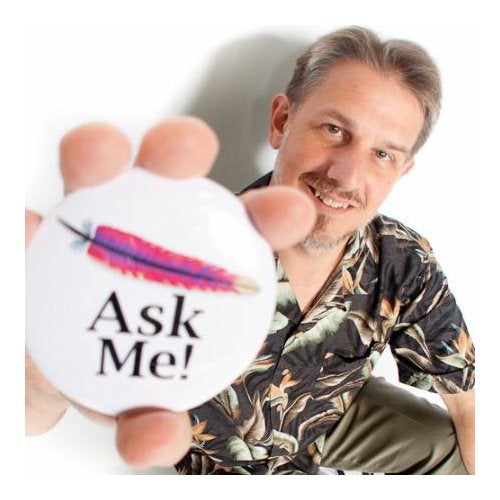
Shane is founder of Punderthings℠ LLC consultancy, helping organizations find better ways to engage with the critical open source projects that power modern technology and business. He blogs and tweets about open source governance and trademark issues, and has spoken at major technology conferences like ApacheCon, OSCON, All Things Open, Community Leadership Summit, and Ignite.
Shane Curcuru serves as VP Brand Management for the ASF, wrote the trademark and branding policies that cover all 200+ Apache® projects, and assists projects with defining and policing their trademarks, as well as negotiating agreements with various software vendors using Apache software brands. Shane is serving a seventh term as an elected Director of the ASF, providing governance oversight, community mentoring, and fiscal review for all Apache projects.
Otherwise, Shane is: a father and husband, a BMW driver and punny guy. Oh, and we have cats! Follow @ShaneCurcuru and read about open source communities and see my FOSS Foundation directory.

Authored Comments
Great article with broad concepts, but it really needs a follow-on to discuss some of the more practical aspects connecting organizations with their customers - i.e. the entities who will pay some sort of salary (or even just hosting costs).
The hacker ethic is important socially, but it operates on the individual level. Once you talk about an open *organization*, there are more aspects to how the world sees, interacts with, and considers using the outputs of an organization that really need some discussion. Code is only valuable to the world if other people use it: individual hacker projects are less likely to actually get *used* in the larger world than community or company-driven projects.
Separately, the really big looming issues are trademarks and brands. People kind-of are thinking about how an open organization builds a brand, although most of us reading opensource.com have far less experience than even the smallest advertising company. But the real issue that is still widely misunderstood is trademarks, and how the law defines ownership for them.
In an "open organization", who owns the trademark? The hacker's point of view is immaterial - it all depends on what the legal entity using the trademark and providing the software product is.
#2 and #3 are both engineer's symptoms: it's not ready yet, I don't want to ship until it's perfect! If you want to grow an open source project, how, *specifically* do you define growth?
It's growth in contributors that you want to foster. Not code. So "ship early, ship often" is critical, because newcomers will often start with downloading a *release*, and then - if they're interested - start looking at the code.
Most people out there aren't interested in your code. They're interested in what problems it solves for them. Having releases - even incomplete - are how newcomers start seeing if your project is interesting (to them!) or not.
Also:
Mistake #0: Not having a LICENSE, preferably a well-known one (MIT, Apache, GPL).
Mistake #... well, there's no number for this, it's a name: not having a good README. One that actually tells people what your code does, how to use it, and how to contribute (or *obvious* pointers to each of those!).
Huh, yeah, great article Jono, but there are a lot more numbers to add to it!